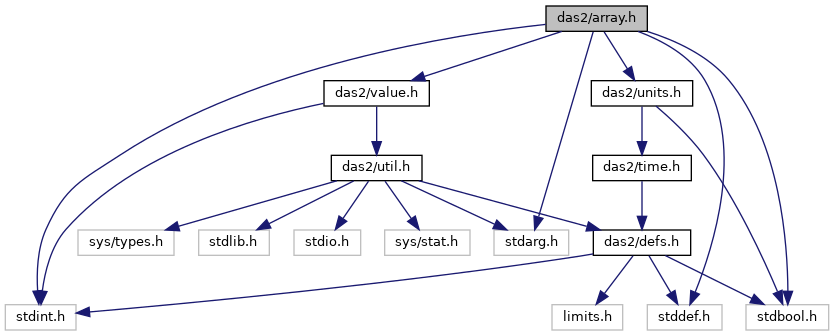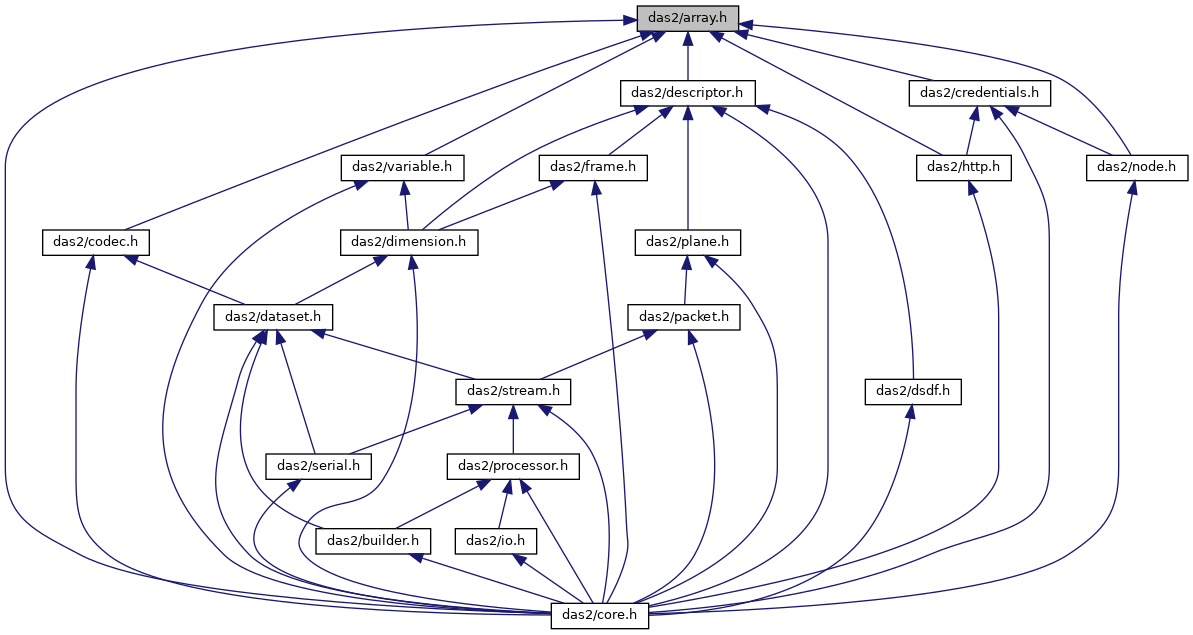 |
das2C
das core C utilities (v3)
|
 |
das2C
das core C utilities (v3)
|
A dynamic buffer with multi-dimensional array style access. More...
#include <stdarg.h>#include <stddef.h>#include <stdint.h>#include <stdbool.h>#include <das2/value.h>#include <das2/units.h>

Go to the source code of this file.
Data Structures | |
| struct | DasAry |
| Dynamic recursive ragged arrays. More... | |
Macros | |
| #define | DASIDX_MAX 8 |
| The maximum number of array indices in das2. | |
| #define | D2ARY_AS_SUBSEQ 0x00000001 |
| This array's elements aren't intended to be addressed to the last index, instead each run of the last index should be used as if it were a complete an individual entity. More... | |
| #define | D2ARY_FILL_TERM 0x00000003 |
| A stronger condition then D2ARY_AS_SUBSEQ. More... | |
| #define | D2ARY_AS_STRING 0x00000007 |
| A still stronger condition than D2ARY_FILL_TERM. More... | |
| #define | DasAry_getPtrAt(pThis, pLoc) *((void**)(DasAry_getAt(pThis, vtUnknown, pLoc))) |
| Wrapper around DasAry_get for vtUnknown pointers. | |
| #define | DasAry_getIntsIn(T, ...) (const int32_t*) DasAry_getIn(T, vtInt, __VA_ARGS__) |
| A wrapper around DasAry_getIn that casts the output and preforms type checking. | |
Functions | |
| char * | das_shape_prnRng (ptrdiff_t *pShape, int iFirstInternal, int nShapeLen, char *sBuf, int nBufLen) |
| Print shape information using symbols i,j,k etc for index positions. More... | |
| char * | das_idx_prn (int nRank, ptrdiff_t *pIdx, size_t uLen, char *sBuf) |
| print a generice set of ptrdiff_t values to a character array | |
| int | das_rng2shape (int nRngRank, const ptrdiff_t *pMin, const ptrdiff_t *pMax, size_t *pShape) |
| Calculate a strided array shape from a min/max range. More... | |
| DAS_API bool | DasAry_init (DasAry *pThis, const char *id, das_val_type et, size_t sz_each, const ubyte *fill, int rank, size_t *shape, das_units units) |
| Same as new_DasAry, but for initializing stack objects instead of making new heap objects. More... | |
| DAS_API DasAry * | new_DasPtrAry (const char *sType, int rank, size_t *shape) |
| A convenience wrapper for storing arrays of pointers. More... | |
| DAS_API void | DasAry_deInit (DasAry *pThis) |
| Similar to dec_dasAry, but for stack objects. | |
| DAS_API size_t | DasAry_memUsed (const DasAry *pThis) |
| Get number of bytes currently used for data values and associated indexes by this dynamic array. More... | |
| DAS_API size_t | DasAry_memOwned (const DasAry *pThis) |
| Get the number of bytes currently owned for use in storing data values and indexes. More... | |
| DAS_API size_t | DasAry_memIndexed (const DasAry *pThis) |
| Get the number of bytes needed to store these values and thier associated indexes. More... | |
| DAS_API const ubyte * | DasAry_getFill (const DasAry *pThis) |
| Return the fill value for this array. More... | |
| DAS_API ubyte * | DasAry_getBuf (DasAry *pThis, das_val_type et, int nDim, ptrdiff_t *pLoc, size_t *pCount) |
| This is the writable pointer version of DasAry_getIn. More... | |
| DAS_API const ubyte * | DasAry_getAllVals (const DasAry *pThis, size_t *pElSize, size_t *pElements) |
| Forget all the fancy indexing, just get a pointer to all the elements. More... | |
Variables | |
| const ptrdiff_t | g_aShapeUnused [DASIDX_MAX] |
| Global instance of unused array, suitable for memcpy. | |
A dynamic buffer with multi-dimensional array style access.
| #define D2ARY_AS_SUBSEQ 0x00000001 |
This array's elements aren't intended to be addressed to the last index, instead each run of the last index should be used as if it were a complete an individual entity.
| #define D2ARY_FILL_TERM 0x00000003 |
A stronger condition then D2ARY_AS_SUBSEQ.
Not only should the last index be ignored when using this array, in addition for each run of the fastest moving index a FILL value is always inserted as the last element.
| #define D2ARY_AS_STRING 0x00000007 |
A still stronger condition than D2ARY_FILL_TERM.
This flag indicates not only that the last index shouldn't be addressed and that each fast-index run is FILL terminated, the fill value is 0. This flag is useful for UTF-8 string data.
| char* das_shape_prnRng | ( | ptrdiff_t * | pShape, |
| int | iFirstInternal, | ||
| int | nShapeLen, | ||
| char * | sBuf, | ||
| int | nBufLen | ||
| ) |
Print shape information using symbols i,j,k etc for index positions.
| pShape | pointer to an array containing shape information |
| iFirstInternal | the index of the first internal index. The index notation changes at this point to use I,J,K instead of i,j,k and the index count reverts back to 0. |
| nShapeLen | An index 1 past the last unsed index in the shape array. |
| sBuf | a buffer to recieve the shape info |
| nBufLen | the length of the buffer. The function will not print past this value - 1 to insure null terminiation. |
| DAS_API bool DasAry_init | ( | DasAry * | pThis, |
| const char * | id, | ||
| das_val_type | et, | ||
| size_t | sz_each, | ||
| const ubyte * | fill, | ||
| int | rank, | ||
| size_t * | shape, | ||
| das_units | units | ||
| ) |
Same as new_DasAry, but for initializing stack objects instead of making new heap objects.
| DAS_API DasAry* new_DasPtrAry | ( | const char * | sType, |
| int | rank, | ||
| size_t * | shape | ||
| ) |
A convenience wrapper for storing arrays of pointers.
This function is the equivalent of the code: void* p = NULL; new_DasAry("MyType", vtUnknown, sizeof(void*), &p, rank, shape, NULL);
| sType | A string identification of the data type. |
| rank | The number of dimensions in the array. This sets the number of arguments needed in the get() function call. To make your code easier to read, the defines RANK_1, RANK_2, ... RANK_8 are provided. |
| shape | The initial shape of the array. One integer is needed here for each dimension in the array. Use the value 0 to set a dimension to be unbounded. |
| DAS_API size_t DasAry_memUsed | ( | const DasAry * | pThis | ) |
Get number of bytes currently used for data values and associated indexes by this dynamic array.
This is not the number of bytes allocated for dynamic storage. It represents how much of the allocated memory is currently in use. Memory is used for the actual data values themselves, as well as the index arrays that point to index roll-over points.
This is the number of bytes of dynamic storage used. For sub-arrays the value is zero, since they don't use any dynamic memory.
| pThis | a DasAry structure |
| DAS_API size_t DasAry_memOwned | ( | const DasAry * | pThis | ) |
Get the number of bytes currently owned for use in storing data values and indexes.
This is the number of bytes allocated for dynamic storage. For sub-arrays the value is zero, since they don't own thier own memory.
| pThis | a DasAry structure |
| DAS_API size_t DasAry_memIndexed | ( | const DasAry * | pThis | ) |
Get the number of bytes needed to store these values and thier associated indexes.
Even if the array doesn't own it's own memory, this function will not return unless there are no values accessable by this array.
| pThis | a DasAry structure |
| DAS_API const ubyte* DasAry_getFill | ( | const DasAry * | pThis | ) |
Return the fill value for this array.
The caller is responsible for casting to the proper type
| DAS_API ubyte* DasAry_getBuf | ( | DasAry * | pThis, |
| das_val_type | et, | ||
| int | nDim, | ||
| ptrdiff_t * | pLoc, | ||
| size_t * | pCount | ||
| ) |
This is the writable pointer version of DasAry_getIn.
See the argument list form DasAry_getIn()
| DAS_API const ubyte* DasAry_getAllVals | ( | const DasAry * | pThis, |
| size_t * | pElSize, | ||
| size_t * | pElements | ||
| ) |
Forget all the fancy indexing, just get a pointer to all the elements.
This can be handy for just writing array data to disk, be warned that it is not sufficent. In addition the stride coefficents will need to be saved if the array is a qubic. If not, all the indexes will also need to be saved.
| pThis | A pointer to an array structure |
| pElSize | A pointer to a location to receive the element size |
| pElements | A pointer to a location to receive the number of valid elements |